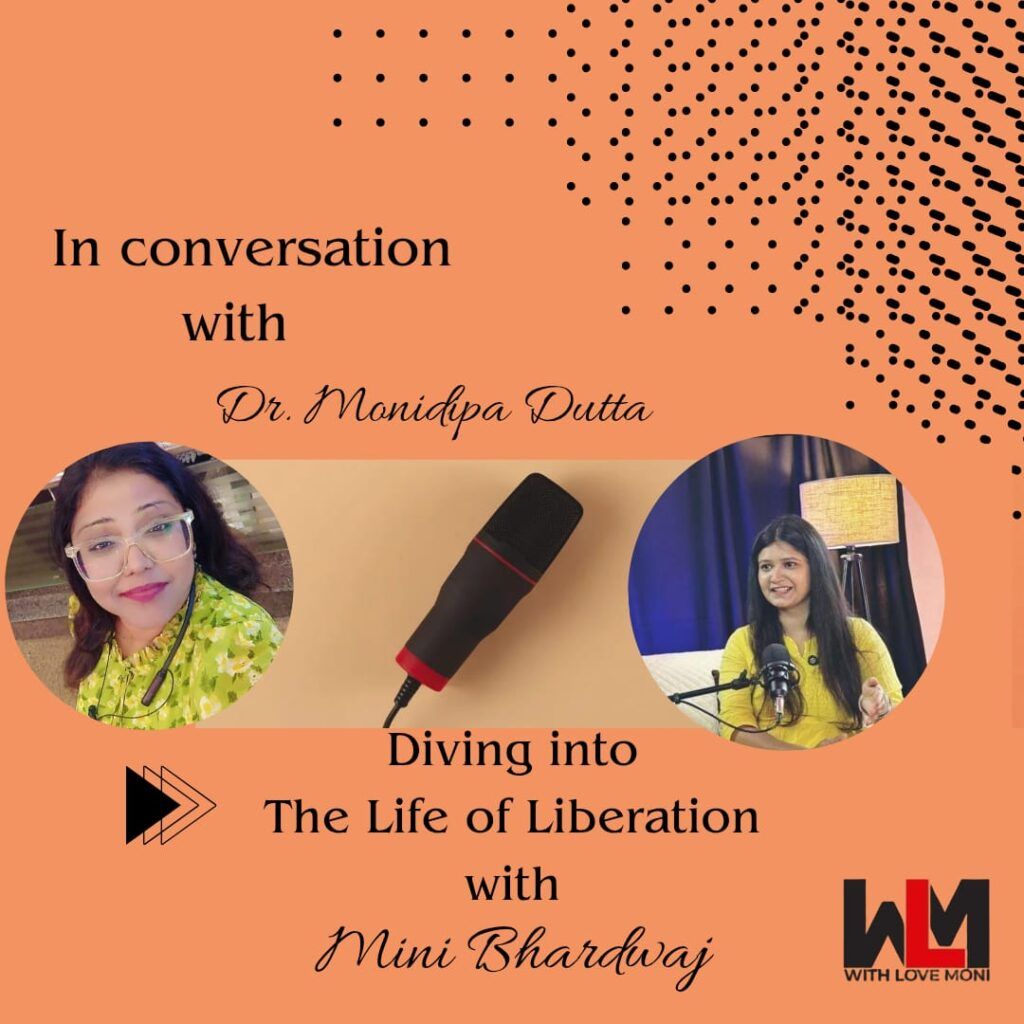In a world where faith is often rushed and spirituality is filtered into short-lived trends, Mini Bhardwaj stands apart as both a seeker and a storyteller. Her book Life of Liberation: A Boon of a Vish Purush – Ashwatthama is not just a narrative; it’s a soul’s journey etched across riverbanks, inner battles, and moments of divine surrender. As I read through her words, I couldn’t help but wonder: what transforms a woman into a pilgrim, and a pilgrim into a voice for the divine?
In this deeply personal conversation, Mini opens up about the sacred whispers of her Narmada Parikrama, the silent strength of the feminine spirit, and the mystical bond she shares with Ashwatthama. These questions aren’t just for answers, they’re meant to be sat with, to stir something within.

Moni: Your Narmada Parikrama was both a physical and spiritual pilgrimage. Could you describe a moment along that sacred river that profoundly shifted your inner perspective, and how that transformation found its way into Life of Liberation?
Mini: For me, Ashwatthama Baba is not a mythical character at all. I consider him my Guru, no matter what the world says. His protection and guidance have been with me since childhood, even during the times when I didn’t consciously know him. Yet, I could always feel that some unseen force was watching over me.
During the Narmada Parikrama, I found answers to all the questions I had been seeking for a long time. And after going through so many challenges, when I finally met Baba, I truly have no words to describe that moment. It was miraculous in every sense. Although I didn’t recognize him at the time, I later realized that it was Baba himself.
Moni: In Life of Liberation, Ashwatthama is not only a mythic figure but also a guiding presence you call ‘Baba’. When you personally encountered him, what emotional and spiritual insights did you gain, and how did those shape the journeys of both Swikirti and yourself?
Mini: The biggest transformation in the lives of both Swikirti and Mini Bhardwaj was this realisation, that Ashwatthama Baba still exists in this world. This awakened a deep belief in our history and culture, because if Ashwatthama exists, then so does Lord Krishna, the Mahabharata, and the Ramayana.
Moni: Ashwatthama’s immortal existence is portrayed as both a boon and a burden in your story. In grappling with this paradox of immortality, did you reflect on your own desires for permanence or your fears of change, and how did this exploration inform your understanding of suffering and liberation?
Mini: Both my books, Seeking Death: A Boon with a Curse and Life of Liberation: A Boon of a Vish Purush Ashwatthama, are based on my personal quest. When I was writing Seeking Death, I felt that immortality was a blessing that had turned into a curse for Ashwatthama, just as the rest of the world believes. But when I set out to find answers to these thoughts, I realized that this curse was, in fact, a blessing. In history, whenever an event happens, it has a past, a present, and a future. Just like Ashwatthama baba received a curse, but because of that very curse, he will be immortal, and in the next Manvantar, he will become one of the Saptarishis and will receive the title of Vyasa. Furthermore, I believe that when we experience suffering, it prepares us for the future, for finding our life’s purpose. As for liberation, I always say that liberation means freedom.
Moni: As a woman who undertook this pilgrimage and is now sharing its story, how do you perceive the role of feminine strength and resilience in navigating a spiritual path, and what unique perspectives do you believe women bring to such quests?
Mini: When I began the parikrama, everyone had the same question upon seeing me — “How did you come alone on this parikrama? Aren’t you afraid?” But I had only one answer, when you are determined to do something, it doesn’t matter whether you are a male or female, you just focus on your goal. And that’s exactly where my focus was. People define the strengths or limitations of male and female, but in spirituality, there is no such difference.
Moni: Writing such a personal and mystical story must have raised deep inner conflicts. What doubts or fears surfaced for you while creating Life of Liberation, and how did confronting them deepen your faith or alter your understanding of the journey?
Mini: So when I completed the parikrama and later thought about launching Life of Liberation, one question stood before me, will people believe my story? And that’s exactly why I included pictures in my book related to every incident I talked about. Secondly, I also felt that I had to bring the truth of Ashwatthama Baba to the world. The information people have about him in society is incomplete, and I wanted to complete that picture, to share the full truth about Baba. That thought alone inspired me to launch the book. And I’m happy that earlier, I used to call him Ashwatthama Baba, and now my readers also call him Ashwatthama Baba.
Moni: During your pilgrimage or in quiet moments of reflection, did you experience any mystical signs—such as vivid dreams, synchronistic events, or profound intuitions—that felt like guidance from the divine? How do you translate those sacred experiences into the language of your novel without losing their ineffable quality?
Mini: So I have named the Narmada Parikrama “Journey of Miracles” because whoever embarks on this journey inevitably experiences miracles. I believe that if someone truly wants to know whether God exists or not, they should do the Narmada Parikrama at least once in their life. Because only those who undertake this journey can truly understand the glory of Narmada Maa.
Moni: You describe yourself as both a lifelong seeker and a storyteller. In what ways has the act of writing become part of your spiritual practice, and how do these roles feed into or challenge each other on your path?
Mini: Actually, I didn’t choose writing. I believe it’s a gift I received from the divine. I never imagined I would become a writer. It was my spirituality that became the reason behind my writing journey. When I started searching for Ashwatthama Baba and began to understand him, I felt it was very important to bring his truth to people. When I wrote my first draft, one question arose in my mind, “I don’t want to write fiction”, I want to write what is true. And that was the biggest challenge, because everywhere there is just one story about Ashwatthama Baba, that he is cursed, that Lord Krishna cursed him. But I wanted to write about the past, present, and future why he was cursed in the first place, and what the outcome of that curse will be in the future. With this thought, I set out in search of him, and Narmada Parikrama came to me as the answer.
Moni: Looking back, what does ‘liberation’ mean to you now, both in your personal life and in the context of your book? Do you see liberation as an endpoint on a journey, an ongoing process, or something beyond words, and how has your pilgrimage shaped this understanding?
Mini: To be honest, I myself am still searching for the true meaning of liberation. So far, what I’ve understood is that liberation doesn’t just mean freedom from the cycle of birth and death, “it means freedom” Freedom from your own sins. The rest of the search is still ongoing, and I believe I’ll be able to explain it more clearly in my third book, once I find the complete answer myself.

Speaking with Mini Bhardwaj felt less like an interview and more like listening to the river she walked alongside quiet, persistent, filled with undercurrents of truth. Her journey reminds us that liberation isn’t a place we arrive at, but a rhythm we begin to hear when we walk in faith, speak with the divine, and surrender to something greater than ourselves.
I hope this conversation leaves you as reflective and moved as it left me. If you’ve felt something stir within you while reading, perhaps it’s your own inner seeker asking to be heard.


